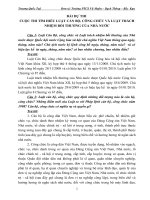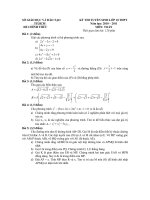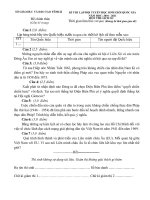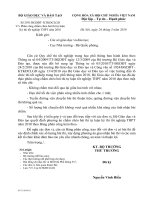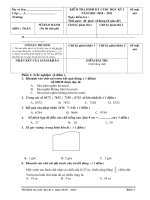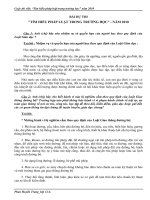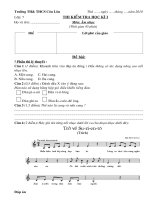Bài thi FCE for Schools 2010 (Speaking)
Bạn đang xem bản rút gọn của tài liệu. Xem và tải ngay bản đầy đủ của tài liệu tại đây (713.43 KB, 4 trang )
PAPER 5: SPEAKING
Parts 1 and 2
PAPER 5: SPEAKING
Part 2
PAPER 5: SPEAKING
Parts 3 and 4
Assessment
Throughout the test candidates are assessed on their own individual
performance and not in relation to each other, by two examiners. The
assessor awards marks according to four analytical criteria:
• Grammar and Vocabulary
• Discourse Management
• Pronunciation
• Interactive Communication.
The interlocutor awards a mark for Global Achievement.
■ Grammar and Vocabulary
This refers to the accurate and appropriate use of a range of grammatical
forms and vocabulary. Performance is viewed in terms of the overall
effectiveness of the language used in spoken interaction.
■ Discourse Management
This refers to the candidate’s ability to link utterances together to form
coherent speech, without undue hesitation. The utterances should be
relevant to the tasks and should be arranged logically to develop the
themes or arguments required by the tasks.
■ Pronunciation
This refers to the candidate’s ability to produce intelligible utterances to
fulfil the task requirements. This includes stress and intonation as well
as individual sounds. Examiners put themselves in the position of a non-
ESOL specialist and assess the overall impact of the pronunciation and the
degree of effort required to understand the candidate.
■ Interactive Communication
This refers to the candidate’s ability to take an active part in the
development of the discourse. This requires an ability to participate in the
range of interactive situations in the test and to develop discussions on a
range of topics by initiating and responding appropriately. This also refers
to the deployment of strategies to maintain interaction at an appropriate
level throughout the test so that the tasks can be fulfilled.
■ Global Achievement
This refers to the candidate’s overall effectiveness in dealing with the tasks
in the four separate parts of the Cambridge English: First for Schools Speaking
test. The global mark is an independent impression mark which reflects
the assessment of the candidate’s performance from the interlocutor’s
perspective.
Marking
Assessment is based on performance in the whole test, and is not related
to performance in particular parts of the test. In many countries, Oral
Examiners are assigned to teams, each of which is led by a Team Leader
who may be responsible for approximately 15 Oral Examiners. Team
Leaders give advice and support to Oral Examiners, as required. The
Team Leaders are responsible to a Professional Support Leader, who is
the professional representative of Cambridge ESOL for the Speaking tests.
Professional Support Leaders are appointed by Cambridge ESOL and
attend an annual co-ordination and development session in the UK. Team
Leaders are appointed by the Professional Support Leader in consultation
with the local administration.
After initial training of examiners, standardisation of marking is maintained
by both annual examiner co-ordination sessions and by monitoring visits
to centres by Team Leaders. During co-ordination sessions, examiners
watch and discuss sample Speaking tests recorded on video and then
conduct practice tests with volunteer candidates in order to establish a
common standard of assessment. The sample tests on video are selected
to demonstrate a range of nationalities and different levels of competence,
and are pre-marked by a team of experienced assessors.
